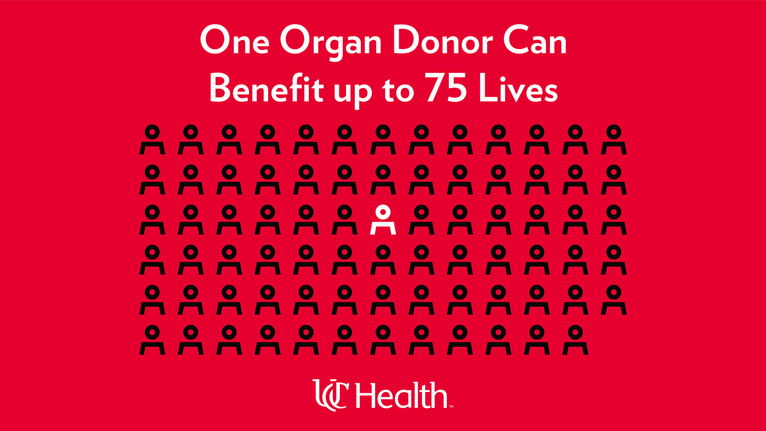Organ and tissue donation is not just for deceased individuals
Typically, when we think of organ donation, we think of receiving organs from a deceased donor. There is also such a thing as a living donor, which comes from people who willingly agree to give one organ or a portion of their organ while they are still alive and healthy, and typically involves donating a kidney or a portion of the liver. There are far reaching benefits to living donor donation.
Living donor kidney transplant benefits:
- Reduced waiting times for an organ.
- Offers better long-term success than deceased kidney donor transplants.
- Close to 96% of living donor kidneys are functioning at the end of the first year.
- On average, a living donor transplant lasts 20 years.
- Increased odds of immediate kidney function.
- Fewer medications are needed to prevent rejection.
- Rejections are less common.
- Avoidance of dialysis before transplantation in some patients.
- Immunosuppression can be started on the recipient prior to the transplant.
- Surgery can be scheduled when the recipient is in optimal medical condition.
- Recipient experiences less discomfort following the procedure.
- Recipient may have a shortened length of hospital stay.
- Recipient may return to previous activity level earlier.
- After donation, a healthy donor can lead a normal life with only one kidney.
- The life expectancy and general health of the living donor are not significantly adversely affected by donating a kidney.
- The risk of the donor developing kidney failure is no different than if he or she had never donated a kidney.
- Kidney donation does not affect an individual’s ability to have children.
- Living Donor Kidney surgery is done laparoscopically through only a few small incisions, significantly reducing the length of the hospital stay to only one to two days.
Living donor liver transplant benefits:
- Within 8-12 weeks after liver donation, the liver will regenerate to its full capacity at 90-100% of its original size prior to donation.
- Benefits both the recipient and another candidate on the waitlist.
- Shorter wait time to receive a liver transplant.
- Reduces the risk of worsening disease for the recipient.
- Preplanned surgical donation date.
- Optimal donor graft.
- Shorter ischemic time.
- Improved long-term outcomes.
- Faster recovery.
Did you know? Liver and kidney disease kills over 96,000 each year—more people than breast cancer and prostate cancer combined. One in seven, or 37 million Americans, have kidney disease—and most don't even know it.
Organ donation can come from any age group
Another common misconception is that only young and healthy people can donate organs. While it is true that organs from younger donors tend to be healthier and have a higher success rate, there is no age limit for donating organs—donors can be of any age, including newborns, children and adults. The suitability of tissue donors and organs for donation is determined on a case-by-case basis.
Donating organs does not cost money
Another common concern is that donating organs will be expensive for the donor's family, but donating an organ is completely free. The donor's family will not be charged for any medical expenses associated with the donation process. Additionally, donating an organ does not affect funeral arrangements for a deceased donor, so the donor's family can still have a traditional open casket funeral if they wish.
Organ donation is a personal decision
Deciding whether or not to become an organ donor is a personal decision. Some people may have religious or cultural beliefs that prevent them from donating organs, while others may have personal reasons for not wanting to donate. Religions can be antagonistic towards organ donations, but luckily, most major religions support organ and organ tissue donation in the modern day. It is important to discuss your wishes with your loved ones so that they can make an informed decision on your behalf if the need for a donation arises.
Organ donation can provide closure for grieving families
For many deceased donor families, the decision to donate their loved one's organs provides a sense of comfort and closure during a difficult time to save lives. Knowing that their loved one has helped save up to 75 lives of others can be a source of pride and comfort, even during a difficult time.
Life-saving decision
Organ donation is a life-saving decision that can help improve the lives of countless individuals. The need for both organ and tissue donation is high, and every donation can make a significant impact. If you are interested in becoming an organ donor, it is important to discuss your decision with your loved ones and register in your state. You can also become a living donor and donate the gift of life by donating your kidney or part of your liver in as soon as a few weeks, pending test results.


